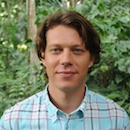George Schoneveld
George Schoneveld is a business economist and geographer focusing on value chains, finance and investment. He obtained master’s degrees in International Business in 2003, and International Development Studies in 2008, and a PhD in Political and Economic Geography in 2013. He has research and project management experience in Africa (Ghana, Uganda, Tanzania, Mozambique, Zambia, Zimbabwe, Nigeria and Ethiopia), Latin America (Peru and Brazil) and Asia (India, Thailand and Indonesia). He is currently the coordinator of the CGIAR Forest, Trees, and Agroforestry (FTA) cluster on Inclusive Business and Finance, specializing amongst other things in inclusive and sustainable business model innovation, land-based investment, value chain development, political economy, land governance and sustainable livelihoods. He is well versed in a wide range of research methods, ranging from remote sensing to econometrics, cost-benefit analysis, political economy analysis, participatory scenario modelling, value chain analysis, network analysis and participatory/multistakeholder approaches.














